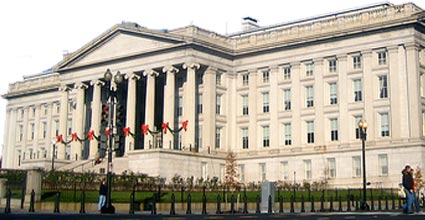The Obama administration is planning to increase its oversight of CEO pay. A top Treasury Department official, Kenneth Feinberg, will be charged with monitoring executive compensation at companies that have been bailed out more than once. Feinberg will have to approve any changes in compensation at those firms. The administration is also drafting broader principles that will apply to all banks and be enforced—or not enforced—by federal regulators. The New York Times explains:
The set of broad pay principles being drafted by the Treasury Department would authorize regulators to tell a bank to alter its compensation arrangements if it is found to encourage too much risk-taking. It is not clear how the government will define too much risk.
According to the two government officials, the new principles will not include bonus restrictions, although they will encourage banks to set compensation in a way that avoids rewarding risk-taking through short-term bonus awards. They will apply to a broad swath of financial companies, even the United States operations of foreign banks, as well as private companies like hedge funds and private equity firms.
It’s great that the administration finally seems to be taking the executive pay issue seriously. But back in 2007, then-Senator Barack Obama championed a weaker executive compensation reform that now seems to have gone by the wayside. It was called “say on pay,” and would have allowed stockowners a non-binding vote to express their displeasure with a company’s pay packages. As Mother Jones reported in March, a top Geithner aide, Mark Patterson, was one of the financial industry lobbyists fighting Obama’s “say on pay” legislation. Patterson and his Wall Street bosses won that battle, and Obama’s reform never became law. Now Patterson is Geithner’s chief of staff. This time around, though, it seems like Patterson’s former Wall Street bosses are the ones who aren’t getting much of a say on pay.















